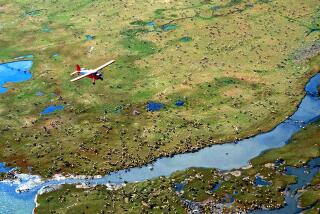Oil Politics and Caribou Herds
- Share via
“Caribou’s Plight Intersects Oil Debate” (July 5) brought tears to my eyes with its well-told story of the struggle of the caribou along the wild plain and tundra of the Arctic National Wildlife Refuge.
I look up at the caribou horn on my bookshelf, carried to Los Angeles 12 years ago by a delegation of elders from a Gwich’in village in the Brooks Range. As a member of the executive committee of the Sierra Club Angeles Chapter, my peers and I listened as the Gwich’in told of declining caribou herds and asked for our support to thwart efforts by the previous Bush administration to open up the refuge to oil drilling.
Now, over a decade later, President Bush carries on the environmentally catastrophic legacy of his father’s administration. In a state where every resident receives a check from the oil companies that drill on Alaskan soil, the Gwich’in, the biologists and those of us who look on in horror from afar have an uphill battle in protecting not only the caribou but every other species that makes a home in the refuge.
Wynne Benti
Bishop
The Times reports that “late winter snows have forced thousands of caribou to calve along the arduous inland migration route, many miles from the safety of the coastal plain. . . . Early estimates are that up to 15,000 of this year’s calves will fall victim to predators, starvation or fatigue.”
An environmental group opines that nature is bad, but industrial development might be worse. But maybe not. The Times writes, “In fact, caribou and oil drilling may not be mutually exclusive. The central Arctic herd, which roams the massive Prudhoe Bay oil field, last year recorded its highest numbers ever.”
So why the headline? The plight of the caribou described is clearly due to nature. Further, oil companies agree to stop operations during the calving season.
Margaret Morell
Buena Park
During the Second World War, I was stationed in the far north of Alaska. I loved the unspoiled beauty and the primitiveness of the land. Your article regarding the caribou herds told the story, as nothing else could, of the desperate need for their preservation. Whether tourists visit there is irrelevant. There must be space on this planet for wild animals to live and survive without human intrusion.
Robert L. Douglass
Los Angeles
More to Read
Sign up for Essential California
The most important California stories and recommendations in your inbox every morning.
You may occasionally receive promotional content from the Los Angeles Times.













